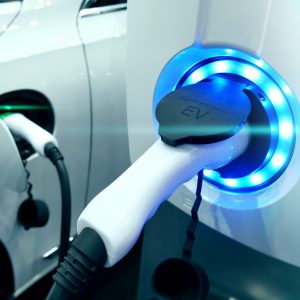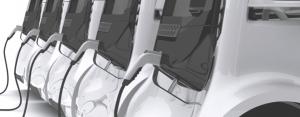Rapid Innovation in the Automotive Industry
At the tail end of 2019, industry analysts suggested that European carmakers were gearing up to make 2020 the year of the electric car. In fact, July 2020 saw a record-breaking number of electric vehicles registered in Europe and global sales rise 43% throughout the year. But, as industrial ambitions were put largely on-hold due to the global pandemic, could it be that the real year of the electric car will be 2021?
Join TECHNIA, Dassault Systèmes and industry leaders on April 28th for a virtual event entitled, Automotive Industry Spotlight: Accelerating Sustainable Innovation, that will bring together Automotive and Motorsport OEMs, Supply Chains and Start-ups to explore the sustainable future of transport and mobility. Register here.
Accelerating Sustainable Innovation
A wave of new entrants and start-ups to the market poses a substantial challenge to established automotive OEMs. This is further complicated by the inconsistent speed of the EV market growth. These factors have put considerable pressure on traditional automotive manufacturers to take up more creative, innovative approaches in an already competitive space.
So, what are some of the new technologies and product development approaches that are being borne out of this creative furnace?
Improving EV Battery Technology
We’ve had over one hundred years of design and manufacturing innovation since the first commercial, battery-powered vehicles. And, despite a successful decade for electric vehicles, ongoing consumer concern has led manufacturers to innovate new battery technologies which aim to outperform li-ion batteries and put an end to “range-anxiety”.
Solid-state batteries, such as those manufactured by Samsung, Toyota, and Volkswagen-backed venture, QuantumScape could provide up to 2.5x the energy density while extending both the effective range and lifecycle of EV batteries.
Estonian ultracapacitor manufacturer, Skeleton Technologies have been working with Karlsruhe Institute of Technology to develop a ground-breaking graphene battery which achieves a charging time of just 15 seconds.
These batteries won’t provide the energy density needed to replace li-ion batteries. But they could serve as an effective supplement in hybrid vehicles to improve user experience and serve as a stopgap while comprehensive EV infrastructures are in development. Most importantly for supply chains, they could be manufactured rapidly at scale using familiar processes and tools.
Ultrafast Wireless EV Charging
There are countless innovative projects tackling range anxiety from all angles – from Vehicle-to-grid infrastructural charging to solar-powered vehicles. Which of these will be the dominant market force in twenty to thirty years’ time remains to be seen. But if there’s one thing that consumers value more than familiarity, it’s usability.
Why plug your vehicle in at a petrol pump or electric charging station when you could simply park up and walk away?  This is the question that drove the WiTricity Corporation – a commercial enterprise founded by a team of physicists from Massachusetts Institute of Technology – to develop their patented DRIVE Solutions for wireless EV charging. Wireless charging, or inductive charging, works by creating a magnetic-resonance field between a transmitter and a receiver.
This is the question that drove the WiTricity Corporation – a commercial enterprise founded by a team of physicists from Massachusetts Institute of Technology – to develop their patented DRIVE Solutions for wireless EV charging. Wireless charging, or inductive charging, works by creating a magnetic-resonance field between a transmitter and a receiver.
But what if you didn’t need to stop at all to charge your vehicle? In 2019, the first trial of in-road charging for electric trucks using inductive charging systems began with success of the Swedish Smartroad Gotland. Israeli tech-firm, Electreon designed the system to be capable of leveraging existing infrastructure to supply convenient, sustainable charging to any wireless-charging electric vehicle.
TECHNIA’s Experience…
It’s now vital to the industry that supply chain collaboration is operating at peak efficiency. As automotive manufacturers are adapting to the market, changing their products and processes, so too must suppliers. These kinds of challenges require a connected, collaborative and flexible approach.
Automotive supply chains have been forced into agile frameworks during the past year. While some diversified, others stockpiled or postponed in anticipation of resurgent demand. One positive found in this challenging period is that supply chain manufacturers have accelerated digitalization strategies that may otherwise have stretched out into the next 3-5 years. Now, they’re better prepared to meet fast-moving consumer demands as Automotive OEMs chase consumer demand down the road to net zero.
Automotive innovation is becoming an increasingly consolidated endeavour. We’re seeing larger OEMs working together with start-ups and supply chain manufacturers to solve some of the industry’s crucial challenges. Industry analysts such as Autoforecast Solutions are already suggesting that Automotive OEMs may necessarily take on a new role as Mobility Companies, “selling services, putting their badge on [a vehicle] but being heavily reliant on the supply base to actually build it.
The competitive nature of the automotive sector has served as a catalyst for progression in the past. But progress today means working together to accelerate sustainable innovation.
Join the discussion! Meet TECHNIA and seminar participants online for the Automotive Industry Spotlight to hear from industry experts, network, and start your own collaborative success story at ev.plmif.org
